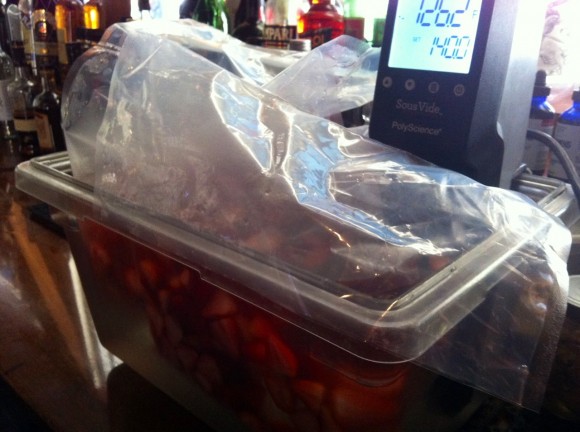FLAVOR FULL
Contributed by on Aug 28, 2013
One reader loves this post.
Exploring Differences Between Macerations And Infusions
By LeNell Camacho Santa Ana
Photo courtesy of Charles Steadman
Head scratching and head spinning often results when the question arises about the difference between maceration and infusion. Chefs and bar pros often give different answers. Pull out good ole Merriam-Webster and the head scratching continues. Maceration is defined as “to cause to become soft or separated into constituent elements by or as if by steeping in fluid; broadly: steep, soak.” Merriam-Webster tells us that the verb infuse means “to steep in liquid (as water) without boiling so as to extract the soluble constituents or principles.” Are we clear, yet?
Posing the question to Executive Chef Jeffery Hansell helped clarify. Chef Hansell’s recently taken the helm at Birmingham’s Veranda on Highland restaurant (www.verandaonhighland.com). His background includes NOLA’s Commander’s Palace (www.commanderspalace.com) and Lüke (www.lukeneworleans.com). He also worked under chefs Ryan Hardy and Robert McCormick at Montagna at the Aspen, Colorado luxury ski resort Little Nell. He admitted that even chefs don’t have a crystal clear delineation between maceration and infusion.
In his mind, maceration often involves fruit in a decomposition process usually in its own juice, such as the crushing of grapes in the fermentation of wine. He always thinks of infusion as flavoring oil, alcohol, or other liquid with herbs, spices, fruit, or various other products. “I start with an infusion every day…in a French press,” he joked.
All joking aside, some argue that maceration is simply cold infusion or subtle heat infusion and perhaps more time-consuming. Some alcohol control boards argue that maceration involves alcohol instead of water in the making of cordials and liqueurs.
Basically, maceration involves soaking food in liquid to infuse flavor. An infusion is a very simple chemical process when botanicals release their active ingredients easily in some sort of liquid like water, oil or alcohol and may or may not involve some sort of heat. The botanicals are typically dried herbs, flowers, fruit or vegetables.
Still confused?
When we stuff strawberries into a bottle of tequila, we infuse the tequila with strawberry flavor. The softened fruit macerates. In making a mojito, we muddle mint in a rum drink. The rum is infused by the mint. The mint is macerated.
Got it?

